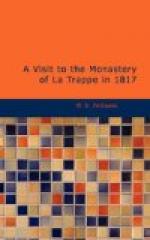In 1810, our government laid a plan to liberate King Ferdinand VII. of Spain, similar to the one which had already effected the escape of the Marquis de la Romana. The person entrusted with this commission, assumed the name of Baron de Kolly, and besides the necessary credit and credentials, he was furnished with the original letter, written by Charles IV. to George III. in 1802, notifying the marriage of his son, the Prince of the Asturias, and containing a marginal note from the Marquis W.... in corroboration of his mission. A small squadron was also sent to cruize off that part of the coast most contiguous to Valencay, under the orders of Commodore C.... to be in readiness to receive the royal fugitive. On a sudden the Baron de Kolly was seized, and the plan frustrated, but the real particulars were never known until after the events of the campaign of 1815.
In the course of the passage to St. Helena, Admiral C.... (who had been entrusted with the project) expressed a wish to know of Buonaparte, by what means de Kolly had been discovered and arrested, and the true circumstances of the affair so totally unknown in England, adding, that if no motive of state policy intervened, he was anxious to hear the whole disclosure. Buonaparte readily consented, and told him that de Kolly arrived at Paris and lived in the greatest obscurity, dressed shabbily, and eating his meals only at cheap traiteurs in the Fauxbourg St. Antoine. However, he was not satisfied with the common wine served up, and would ask for the best Bordeaux, for which he paid five francs per bottle. This contrast of poverty and luxury excited suspicions in the waiters of the two houses he thus frequented, who being in the pay of the police, immediately sent in a report. De Kolly was watched, and soon afterwards seized with all his papers. Buonaparte said he then procured a person, as nearly resembling de Kolly as could be found, to carry on the English stratagem, under a hope that Ferdinand would have fallen into the trap; and with all the original credentials, this agent of the French police went into the castle of Valencay, under a pretext of selling some trinkets. Ferdinand however, said Buonaparte, was too great a coward to enter into the views proposed to him, but instantly gave information of what had been communicated, to his first chamberlain, Amazada, in a letter written to the governor of the castle!—By this means Ferdinand escaped being placed at the mercy of Buonaparte, whose intention was to intercept him in his flight.
Although the conduct of Ferdinand was in this instance pusillanimous and cruel, it was next to an impossibility that he could have effected his escape. He was surrounded by guards and spies of every description, under the superintendence of M. Darberg, Auditor of the Council of State, and without whose leave no admittance could be obtained. Twenty-five horse gendarmes regularly mounted guard about the castle, and every person found in its vicinity without a regular passport, was confined and strictly examined.




